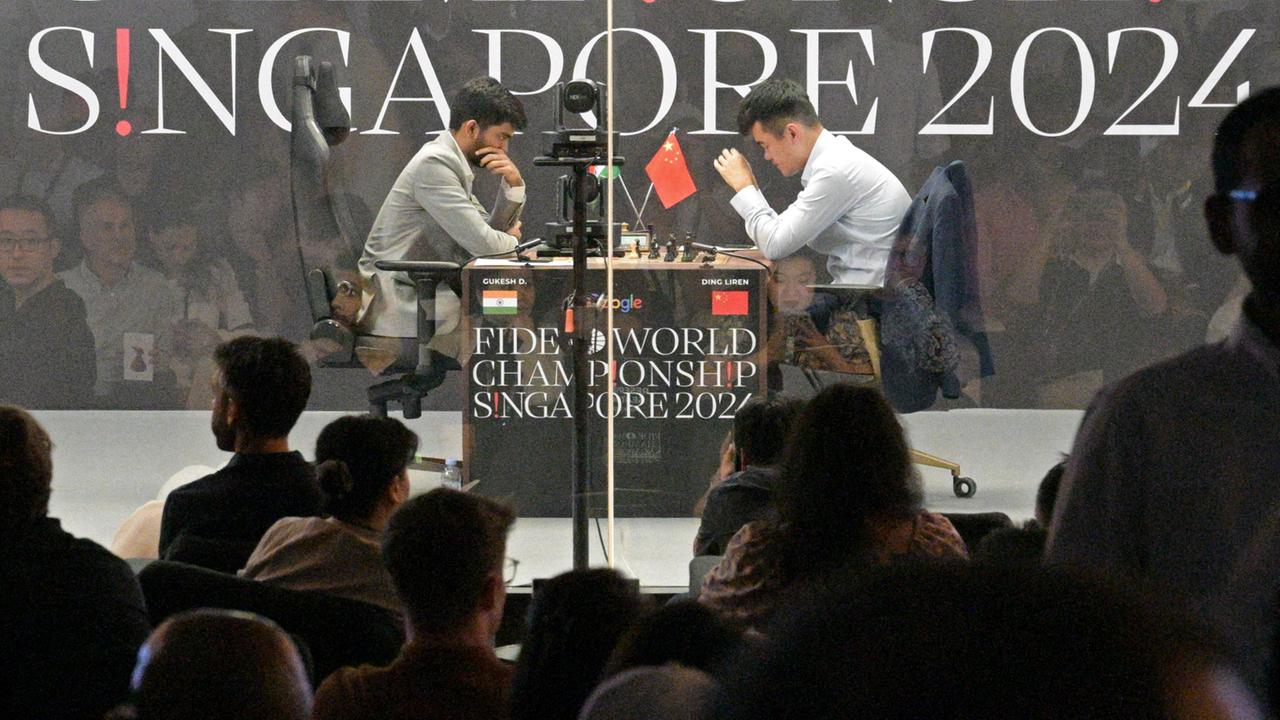The final of the World Chess Championship in Singapore could hardly be more exciting. It is a draw between the Indian Dommaraju and the Chinese Liren. In the end, a play-off could decide.
The two players sit in a soundproof and opaque glass box. Nothing should disturb your concentration.
There are many children in the audience at a luxury hotel on Sentosa Island in Singapore. A father plays with his daughter and son on a miniature chess board. A boy follows the commentating live stream on his cell phone.
For the first time, two Asians sit opposite each other at the World Chess Championship.
Audience divided over favorite
18-year-old Gukesh from India is the youngest challenger in history. Many observers give him a good chance. He will face 32-year-old Ding Liren from China. He took over the title last year – from world number one Magnus Carlsen.
The Chinese Ding is the favorite among those watching in Singapore. Many hope the best for him. He's had a difficult time. The 32-year-old struggled with mental problems after his World Cup victory in April last year, slept poorly and was treated in a clinic twice. The Chinese has been back on the chess stage since the beginning of the year, but has lost one game after the other. Nevertheless, he has shown good nerves at the World Cup so far.
There are a particularly large number of young fans on 18-year-old Gukesh's side, like ten-year-old Alexander. “I think he's great. He's not afraid to face such a strong opponent.” Six-year-old Shayne from Hong Kong also wants to become world chess champion. He already has many trophies on the bookshelf in his children's room. “I like chess because it makes my brain work properly.”
Chess as a compulsory subject in some schools
For this reason, chess is compulsory at the Overseas Family School in Singapore. At least from kindergarten to 5th grade. Dijana Dengler teaches there. “You can train a lot of skills through chess, such as thinking ahead, thinking in perspective, thinking backwards. If I have a problem, for example in math, how can I solve it? The children also learn to recognize patterns, which is also important in life. “
She criticizes the fact that chess is still a men's sport today. When she started playing chess around 20 years ago, she was the only girl. “The boys said that the girls have no idea that they have small brains. And I wanted to show them that that's not true.” She trained and won tournaments. Also the prices for men. “For women the prize was a beautiful pen and a rose. For men there was money.”
Prize money is $2.5 million
There is also a lot of money to be won at this World Cup. 200,000 per game won, totaling $2.5 million. The duel is scheduled for up to 14 games. For every win there is one point. Half for every draw. The player who first reaches 7.5 points becomes world champion. If the tie remains as it was at halftime, a play-off will decide.
Who is the favorite for World Cup presenter and chess grandmaster Maurice Ashley? Things are proving to be stronger than many had expected. Young Gukesh impresses him. “His composure is off the charts. I look at him and think the guy must be 38. How can you be so calm, collected and collected when you're playing for the world title and two and a half million dollars!”
In addition, Gukesh is not yet at the peak of his career. He's 18. Chess players don't reach their peak until they're 30 years old. So if the Indian Gukesh doesn't win this World Cup, he will probably get another chance at the world championship title. At halftime it is a draw.





